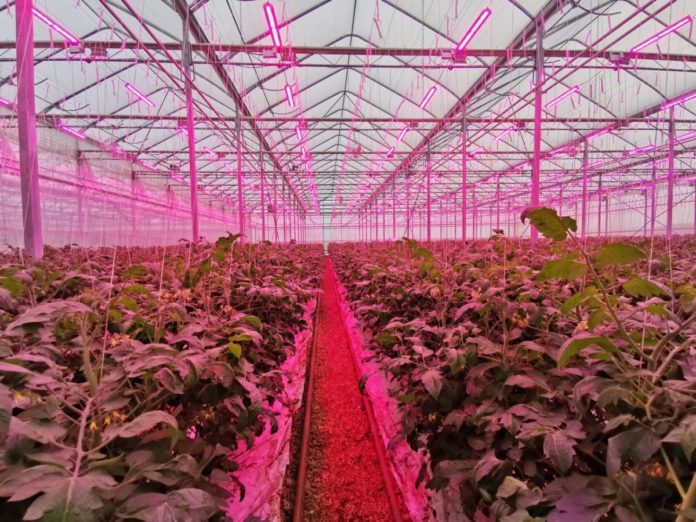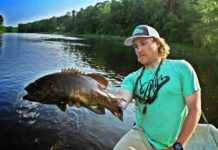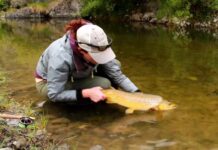Photo of Atlantic Grown
Simple answer, those with the most passion.
As the controlled environment agriculture industry we spend a significant amount of time discussing how we are going to improve our communities, the environment, the farming experience and the quality of food we eat. By themselves these are major commitments. Together they are an enormous commitment. This got me thinking about a simple question, “who should be the leaders of this proposed revolution?” In this post I am going to discuss how we can learn from other industries that are historically conservative as well as providing three three focal points I think we should concentrate on.
To find an answer, I started to think about other interests in my life. For those that know me well you know that I love being outside. (For those that don’t know me, hold on you are about to get some insight.) I started to think about my interest in fly fishing and I started to pay close attention to the challenges this niche industry is experiencing.
In order to explain this better, let me “paint” a picture for you. I don’t get to do this often, not even one time per year (if I am lucky), but one of my most favorite places to be is with one no more than two people on a backwater saltwater flat. A saltwater flat is any area of shallow water with a relatively even bottom. You can find flats in freshwater, but for me I dream of a remote quiet flat with no people and no access to technology. The most iconic place nearest me are the exotic sands of the Bahamas. I am not necessarily there to “catch” a fish, I am more there to capture the experience. The beautiful and hopefully untouched and unpolluted clear ocean water. The amazing sunsets and sunrises. The wildlife. And if lucky, the chance to get to walk up on a tailing fish.
For those of us that live in the United States, one place you can still do this is Florida. Luckily for me I have family in Florida, but this experience in Florida is getting harder and harder to come by. There is constant development. With development you have increased pollution and a growing amount of people putting pressure on a limited resource. And while I think we should all have access, this also means more and more fishermen, many of whom do not share the same values of protecting the resource and the surrounding environment so that it can be there for many generations still to come. Their focus? Land as many fish as possible, kill as many fish as the law will allow (because most everyone I meet does follow the local regulations,) get a photo, share on Instagram and think nothing of the trail of trash and destruction they leave behind.
Now let’s remember that there is a complete industry that makes money off trying to provide me with this experience. Whether it be the airlines that get me there, the hotels that keep me there, the guides that take me there or retailers that sell me all necessities I “require” to be there. These companies and the individuals that make up these companies need these shared resources to continue to make a living, pay taxes and support their families.
And this is where the talk gets oddly political. Not all of those heavily invested in making these experiences possible agree on the best way of protecting these resources. Heck, not all of those individuals even agree that these resources need to be protected.
This leads me back to the basic question, “who’s responsible” for protecting these precious resources?
I started digging deeper into the outdoors industry to see what was actually happening. For those not interested in outdoor activities, it is easy to think that hunters and fishermen/women only really care about going into the wilderness to kill stuff. I realized quickly that within the industry there is a clear difference between a hunter, a fisherman and an outdoorsman. And it’s interesting to see that more and more outdoorsmen/women are leading. They are changing the narrative by encouraging people not to be focused on killing as many fish as they can catch.They are building platforms like Captains for Clean Waters that allow your voice to support science-based solutions and empower your dollar to fight for water quality and hold elected officials accountable. They are better educating themselves by creating entities like Bone and Tarpon Trust to support fisheries through collecting data by using science based methods supported through collaborations with institutes and governments.
Most importantly I noticed that these individuals are also by far the most passionate about their careers, their hobbies and the natural resources. They are motivated because they see the importance of making change now. They are political, but not in the way you would think (I am still trying to figure this one out so I will hold off on additional comments.) They are motivated by money (this is their living), but the money is not directly derived from the actions they are taking to create change. They have convinced their biggest personalities to take a stance while promoting science backed solutions in their most popular venues (tv shows, podcasts, movies and retailers.) Most interesting to me they have convinced these personalities to do this even though it might go against their typical customer base. Realizing that offending their customer base is not as important as protecting the resources that allow them to actually have a client base.
Now let’s get back to one of my earlier questions, “who should be the leaders of these changes in our industry?” I think we can learn from other industries by saying, that those whom are most passionate should be our leaders and we as an industry need to find ways to work together to give those passionate individuals a platform that will help to attract new talent to our industry and better educate those individuals interested in our industry or the consumer eating the produce we so proudly grow.
We need to remember that we don’t need to solve every problem, because that’s not realistic. We need to know that if we all work to solve small manageable problems, collectively we will solve big problems. We need to remember that it’s important to encourage those individuals tackling these problems as they will be the ones that create opportunities for all of us.
So what problems can we solve as the controlled environment agriculture industry?
1. Education: The environmental impact that occurs as farmers feed the world.
We have all read, watched or heard the statistics on how “bad” traditional farming is for the environment. I for one think it’s unfair to put this all on the farmer, but know that the facts support much of the rhetoric. It’s unfair because of economics. Traditional farmers do an amazing job of providing “us” with inexpensive food options because that’s what “we” as the consumer have asked them to grow. This creates a big problem for many farmers I know that spend a significant amount of time contemplating how to best steward their land while producing enough yield to pay the bills. We are asking a lot of these individuals and their relatively small family business.
REMEMBER: FARMING IS A BUSINESS.
This is our opportunity to support voices that educate. We need to encourage voices that can show or present positive environmental outcomes for the future of farming. One which the farmer becomes excited for his future and that of their family. For certain crops and in certain geographies, controlled environment agriculture practices can allow farmers solutions to problems like nitrogen run-off, high pesticide usage and inefficient water use. This technology will also allow the farm to become more labor efficient while extending their selling seasons. Success will be based on how well we take the science based data coming out of universities like Wageningen, Ohio State and North Carolina State and then turn it into something that the farming community, local government and ultimately the consumer can use to change the way they grow and purchase food.
Warning: Our industry needs to be careful that we don’t over promise while at the same time focus on the positive impact we can make while not creating other possibly larger problems.
2. The Platform: Rebuilding of blighted rural and urban communities.
Not historically an “ag” or “hort” conversation, community development is becoming a popular part of many new ventures’ pitch decks. It’s obvious that local politicians in certain areas are interested in this concept, but the reality of cea businesses creating many jobs with good salaries is still yet to be proven.
The interest may well mean it’s our best opportunity at creating a platform with real stakeholders financially committed to helping up drive opportunity forward.
In order to do this we will need to open up and think like a community. We will need to create platforms that support developing an industry within an industry. We will need to arm innovators with the problems that truly need to be solved. We will need to think about how we work together to build up a variety of businesses that have the same focus and shared missions. We will need to think creatively about what business makes sense in what settings.
We will need to think about investing in our industry to create ways of educating the next work generation of workers and leaders. We will need to lobby to get the support of both the financial and political communities. We will need to focus. Most importantly we need to understand it’s not our businesses that will alone strengthen the community but its the creation of opportunities that lift up families giving them the economic means to further their education, improve their diets, become property owners and invest in their own futures.
“Today, our very survival depends on our ability to stay awake, to adjust to new ideas, to remain vigilant and to face the challenge of change.” – Martin Luther King.
3. Changing the Narrative: Health and wellness of individuals in our communities.
For most, the food we eat becomes the center of our social universe. Think about it. Where do people gather when they visit your house? The kitchen. When you think about some of your best memories what is one of the things you remember? The food and drink you had. When you need to feel at home, what do you turn to? Comfort food.
That’s why for me, this for me is a no brainer. We grow fresh produce. We create the fuel people put in their bodies. We have an opportunity to be part of the memories the consumer makes. We need to be proud of this. We need to motivate consumers by educating them to understand why fresh produce is an important component of creating a long healthy happy life filled with good memories surrounded by family, friends and happiness.
We need to promote diets high in fresh vegetables and produce which means challenging the animal protein industry for space on plates. We need to work with chefs to make sure our product is the centerpiece and not a side dish. We need to promote these diets as fashionable and desirable. Not encouraging the stereotypes of meatless diets, but the benefits and enjoyment that comes from a plant based lifestyle with animal proteins as the side dish. We need to look at our own homes and look at the dollars we are spending on our plates. We need to ensure that we are supporting those that support us.
Finally, the exact solutions will not be provided by one person. My colleagues and I continue to work to do what we can to play a small role in improving the environment around us. But, for us to ultimately succeed we will need to identify multiple individuals that have grit, then support them and their passion to solve specific problems. Join me in starting this journey.
Credit: Source link






























